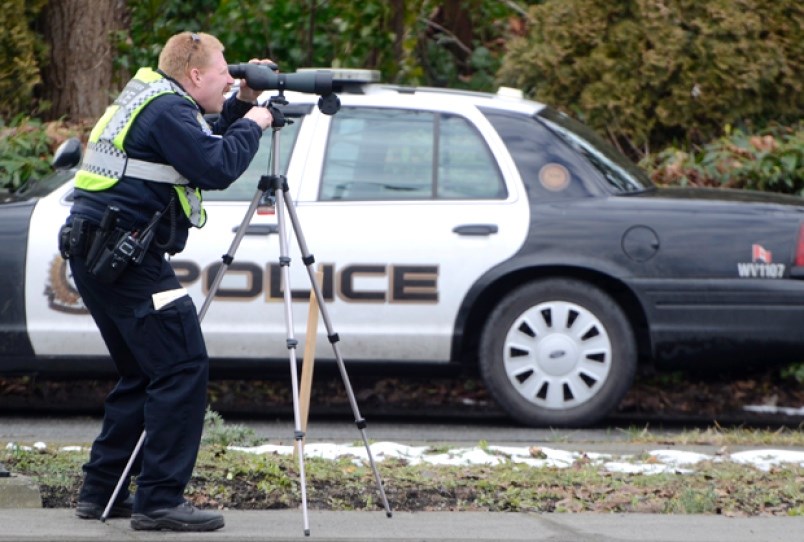Good news, friends, because ICBC is here to protect us all from ourselves.
With accidents on the rise and a potential increase in the insurance rates we’ll all pay, our provincial insurance corporation is instituting a couple of new pilot programs to help combat the scourge of distracted driving.
Distracted driving is a real problem, and has been around ever since 1917, when Mary-Elizabeth Swanset walked down the street with her fetching new bonnet, causing Phineas J. Stuffins to gawk, lose control of his Stanley Steamer, and drive into a lighthouse. I believe they covered the event on an episode of Road To Avonlea.
However, in modern times, the most common distraction is that bane of our modern existence: the so-called smartphone. The smartphone, to paraphrase Peter Egan, makes heroin addiction look like a vague craving for something salty. We simply can’t put the things down, whether it’s to have a family conversation at the dinner table, during a movie, or while performing open-heart surgery.
I hate them with every fibre of my being — sent from my iPhone.
However, the personal electronic crutch/IV-bag/parasite is here to stay, so the question becomes, “what do we do about it?” In the driving sphere, the danger is of course apparent. Sending a text or reading one while moving has been proven to be more dangerous than driving under the influence of alcohol. If reaction times are slowed for the latter, not watching the road at all means there is no reaction, at least not until it’s too late.
Therefore, ICBC’s idea is to come up with an app that’s installed on your phone, and which connects to a device attached to your car to record telematics. Telematics are your car’s speed, acceleration, and braking, and so forth.
From the press release: “The combination of telematics with phone apps typically has allowed insurers to collect driving behaviour data, such as kilometres travelled and average speed. However for this pilot ICBC is interested in the user’s experience with telematics in their vehicle.”
Seems harmless, assuming that ICBC will delete data from volunteers after the program has concluded, which they’ve promised to do. I’m sure there won’t possibly be any enormous leaks of personal data.
As for the ominous-sounding, “Findings from the pilots will be used to inform future decisions around distracted driving prevention and enforcement, as well as changes to improve the fairness of how insurance rates are set,” I’m sure rates won’t be jacked up for anyone who doesn’t want a Big Brother monitoring their every move. Sure. ICBC’s always been quick to put money back in our pockets.
The second part of the pilot is a bit more useful. Starting in the spring of 2018, police will have a new scope for catching distracted drivers in the act, one that will be capable of uploading a photo instantly. The idea is that the image can be transmitted to officers in the area, so that if you get caught texting while driving on the upper levels and pulled over down the road, the constable will be able to quell protestations by showing a picture of you on your phone. And picking your nose too? Disgusting.
If electronic monitoring is the repellent carrot of a distracted driving solution, then enforcement is the stick. And really, the stick seems so effective, I’m convinced we don’t need electronic devices spying on us.
In my perfect world, the Bluetooth-equipped scope wouldn’t just transmit images to police in the area. After you got pulled over, it would send a text of you swervin’ and surfin’ to every single person on your contact list. I’m not sure I’d even include a fine; most people could simply be shamed out of the temptation to text and drive.
In this less-perfect world, where I am not even allowed to have people who speed in school zones fed to the grizzlies atop Grouse Mountain (not even a light nibble!), we simply have to rely on more conventional dissuasion. Get caught driving distracted, get a large fine, and points. Accumulate points, and your insurance rates go up.
Shouldn’t it be this simple? If you’re not an idiot, shouldn’t your insurance rates go down? It’s pretty straightforward to reduce your chances of getting a ticket for distracted driving by putting your phone in your glovebox, or installing an app that features a do not disturb function.
Simply put, if you let ICBC start monitoring our cars, we’ll never get them out of the passenger seat. Further, as was the case with photo radar, whatever the cost is with electronic surveillance, the money could be better spent with boots-on-the-ground enforcement. Give the police the tools they need, give them the coverage to put a team at every high-risk crosswalk in the area, and come up with funds to keep effective volunteer community-policing programs in place.
Distracted driving is a problem for anyone who uses our streets and sidewalks, and we need to come up with solutions to the problem. However, should we sit back, fail to change our own behaviours, and just hope some government agency will take care of the issue, then they just might. And we probably won’t like their fix.
Brendan McAleer is a freelance writer and automotive enthusiast. If you have a suggestion for a column, or would be interested in having your car club featured, please contact him at [email protected]. Follow Brendan on Twitter: @brendan_mcaleer.



